Dear Reader (including those of you who get this “news”letter through long protein strings),
I’m kind of on vacation, but as a co-founder of a startup, a self-employed writer, the father of a daughter some 4,000 miles away, and a man with frighteningly few hobbies, vacation is a hazy concept for me.
I often tell people, “Don’t mind me, I just want to watch you sleep.” They rarely take it well. But that’s not important right now. I also tell people that one of the great things about being a writer is I can do it from anywhere. I then add, one of the worst things about being a writer is I can do it from anywhere. In other words, my work is always with me.
Bill Buckley was a real master of on-the-road writing. I don’t mean in the Kerouac sense, but in the literal one. I’ve heard quite a few stories about how he could meet someone for drinks at the hotel bar while tapping out a column on his portable typewriter. I can’t have a conversation with someone while writing, unless of course “Th4 urst 97220 falange basset hound cytorrak” counts as writing. I need to concentrate a bit. But I have written more columns than I can count from the passenger seat of a car barreling across Montana, the parking lot or lobby of a hotel, or in a camping chair in the backyard of one of my Alaskan relatives.
Since I’m in Sea Island, Georgia, smoking a cigar in a comfortable chair, this should be pretty easy. But I’d still like to take a vacation day of sorts. So instead of not writing a “news”letter at all, I’m going to take a break from writing about politics and write about one of my favorite topics: Dogs, specifically my own. If you’re not interested, that’s fine.
A good place to start: a canine update.
Longtime readers know the basics of Zoë’s story. Indeed, the canine update began because of her. But in case you’re new here, let me recap a bit.
In the beginning there were wolves. Then, for reasons that would take us too much time to discuss here, there were dogs. And dogs were good. They hunted with us. They stood guard. Our enemies were their enemies. Our friends, their friends. In the Great Game of Survival that began when one bit of goo thought it could eat better if it killed some other goo nearby, dogs decided to team up with humans. Dogs took their payment in our leftovers, warmth—bodily and artificial—scritches, pats, and companionship. And, amazingly, their union has never asked for a raise, despite the considerable inflation rate over the last few hundred thousand years. (This is not to say that individual dogs do not, when the opportunity arises, demand compensation above the contract rate. In this, dogs follow the wisdom of everyone’s Jewish aunt—“it never hurts to ask.”)
Fast-forwarding for brevity’s sake, when the first humans crossed the Bering straits 9,000 to 30,000 years ago, they brought some dogs with them. They were good dogs. Some of those humans made their way to the southern United States, probably for the convenient parking and excellent vinegar- and/or mustard-based barbecue sauces. The dogs came with them, no doubt intrigued by all the barbecue talk. These dogs worked with native Americans, just as they had in Asia.
When Europeans came thousands of years later, they brought even more dogs. These dogs largely replaced most of the pre-contact dogs (PCD, though for all intents and purposes the C could stand for Columbus) for many reasons, no doubt including diseases they brought with them. But, the theory goes, some of the original dogs retreated, like Francis Marion, to the swamps and woods of South Carolina and Georgia. These became again, according to theory, lore and science, the Carolina Dog, AKA the American Dingo or the Dixie Dingo.
Now, some of this may in fact fall under the “print the legend” category, because a recent major DNA study found that very few supposed PCD dogs have much PCD DNA in them. Though one Carolina Dog in the study had 30 percent PCD DNA. Carolina Dogs may simply be former landrace Indian dogs—dogs that aren’t bred for a set standard—that hung around in the bush long after the Indians weren’t around anymore (one might even call them a Remnant). They surely interbred with strays outside of their homeowners association, hence the pawcity of PCD DNA and the fact that they come in all sorts of colors, though most are a golden yellow.
Yellow Dogs?
This is the source of a lot of speculation, because stray dogs all around the world are often this color, as are many coyotes, dingoes, etc. In the South stray dogs of the Carolina Dog type were often called “Yeller,” “Yaller” or yellow dogs, hence the term “Yellow Dog Democrat”—meaning someone who’d sooner vote for a “yellow dog” than a Republican. (Not to go back on my word about staying out of politics, but these days I kind of feel that the only candidate I would happily vote for is yellow dog, but that’s not entirely right, since I’d vote for a dog of any color. I don’t see color in the voting booth. A dog presidency would be extremely libertarian and might be America First in the best sense. If I had room here, I’d meditate on the original meaning of cynicism, which is to be dog-like).
Old Yeller, played by a lab-mastiff mix in the movie, might have been a Carolina Dog or related to one—though black mouth curs are another possibility.
Regardless, what is clear from any theory of the Carolina Dog is that they missed out on a lot of the canine eugenics that created most of the breeds we know today.
Cosmo, RIP
Fast-forward one last time. In 2013, Cosmo the Wonder Dog passed away. Cosmo was perhaps the greatest dog who ever lived. I understand that people will dispute this—as they should. If you’ve had a great dog, you should believe that he or she was best dog that ever lived. There is no way to settle this debate. It’s like saying “I love my child more than you love yours.” You feel it to be true because to feel otherwise would be a betrayal of your soul.
Regardless, reasonable people agree that he was a very good boy. And we had a wonderful life with him. He chased caribou in the Canadian Rockies, protected my wife and baby daughter from a drug-addled drifter in Lexington, Massachusetts, peed in Christopher Hitchens’ apartment (he was a puppy, and Hitchens’ apartment was … confusing), and interviewed Kim Jong-il and Pervez Musharraf (with a little help from me). He looked both ways before crossing a street and never needed more than a few days to learn any trick we tried to teach him. When friends got puppies, Cosmo helped train them to be better dogs.
A year later, my wife and I wanted to get a new dog. The Fair Jessica really wanted a German shepherd because we were so spoiled by Cosmo’s intelligence,obedience, and pure doggy goodness. A German shepherd seemed the most likely breed to follow in Cosmo’s paw steps.
God had another plan.
There were some complications. I should note that because Cosmo was a rescue (from D.C.’s New York Avenue shelter), we believed we should get another. If we hadn’t adopted Coz, he probably would have been killed. It seemed the height of ingratitude,indecency, and just bad karma not to get another rescue. But we also wanted a puppy for our young daughter. So we searched and searched and found a “German shepherd mix” named “Shiver” that was found in the winter on the side of the road in Spartanburg, South Carolina, with her brother “Sickle.”
We took delivery of said puppy in a parking lot in northern Virginia (lots of the strays are caravanned up from the South where strays are a much bigger problem). She was adorable.
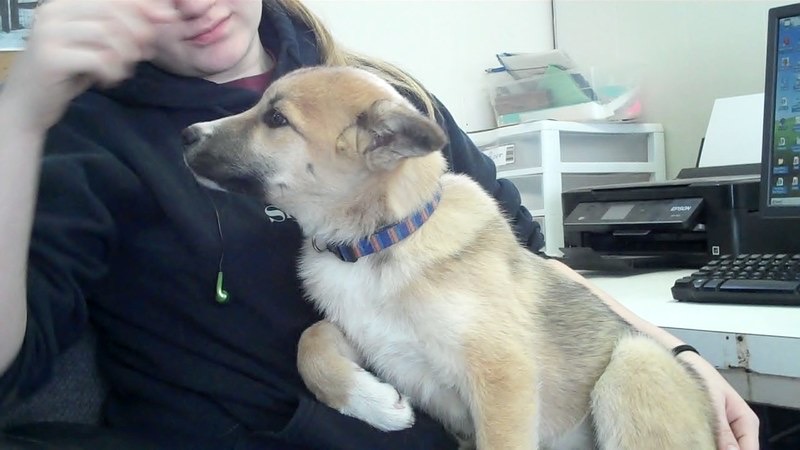
She was also incredibly stoic and low energy. It turned out she had Parvo, a horrible disease that is omnipresent in the United States. (I’ll spare you a detailed exegesis on the worst symptoms, suffice it to say the diagnosis should come with a gift certificate for new carpeting.) But most dogs get the antibodies for Parvo from their mothers. Alas, Zoë didn’t have enough time to nurse with her mom to get them. She nearly died.
Our struggle with Zoë is how the Canine Update started. Once readers found out we had a sick puppy, they kept asking for updates. Thousands of dollars in intensive care later, Zoë was healthy, but people still wanted the updates. Later, when we added Pippa—the English Springer spaniel of Twitter fame—to our family, demand for updates only intensified, in part because Zoë did not welcome Pippa with open arms (legs? Paws?). And in part because, well, folks like dogs—because dogs are good.
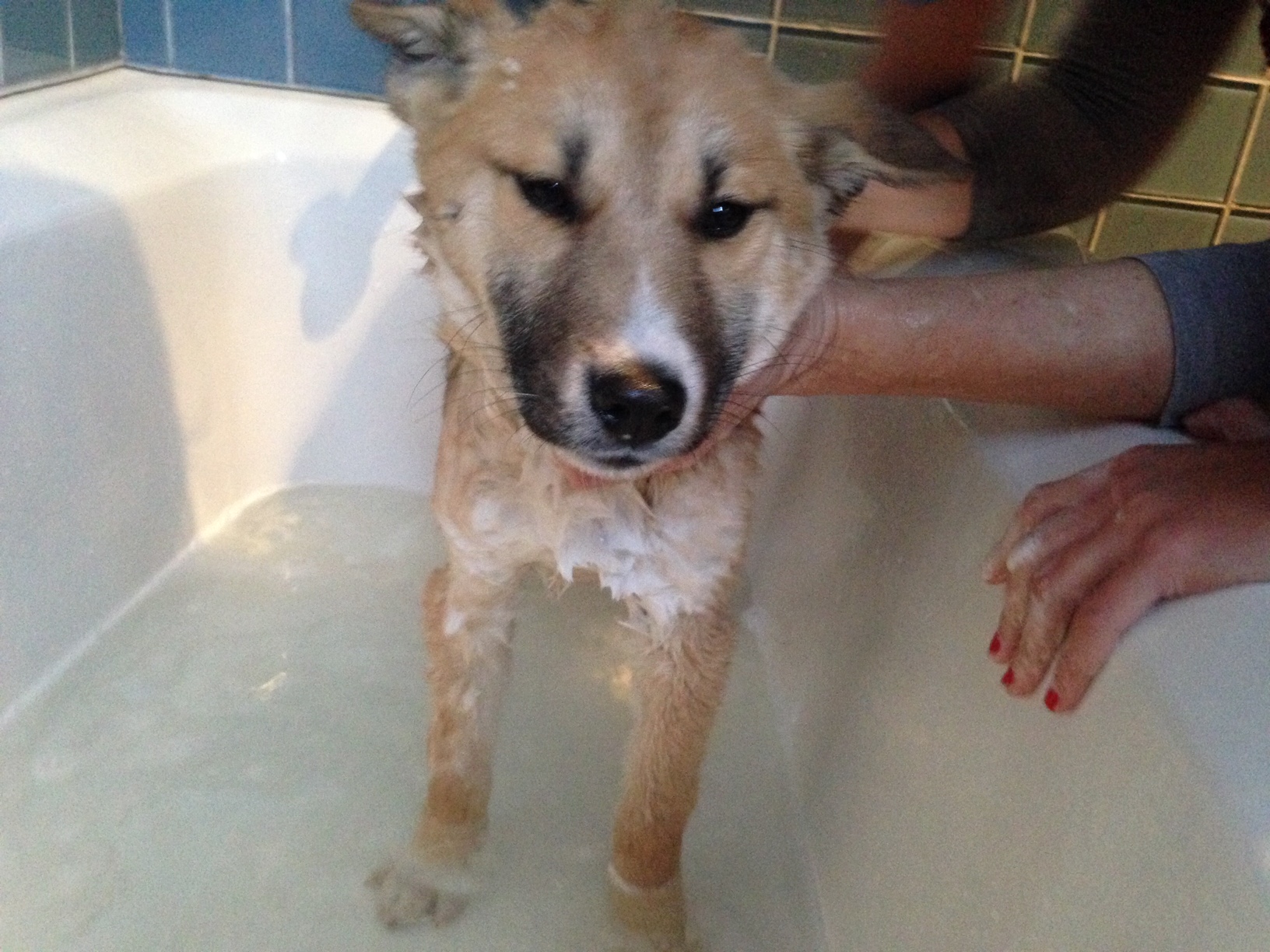
But I’m skipping ahead too far. Once Zoë was healthy, the once-lethargic dog’s true dingo nature emerged. She was a fearsome hunter, killing rabbits, chipmunks, squirrels, voles, mice, groundhogs and lord knows what else. I used to joke that the kennel she came up in should have had the same warning label used on the Tasmanian Devil’s crate. When it became clear that we didn’t like all the killing, she adopted a grotesque technique to avoid us yanking prey from her mouth. If the critter was small enough, she’d swallow it—fur, head, tail and all—in one unsightly gulp.
She seemed untrainable. Once her nostrils filled with the scent of prey, she was a near wild dog. She was loving and loyal, particularly in the house, but Andrew Jackson in his younger years in the woods.
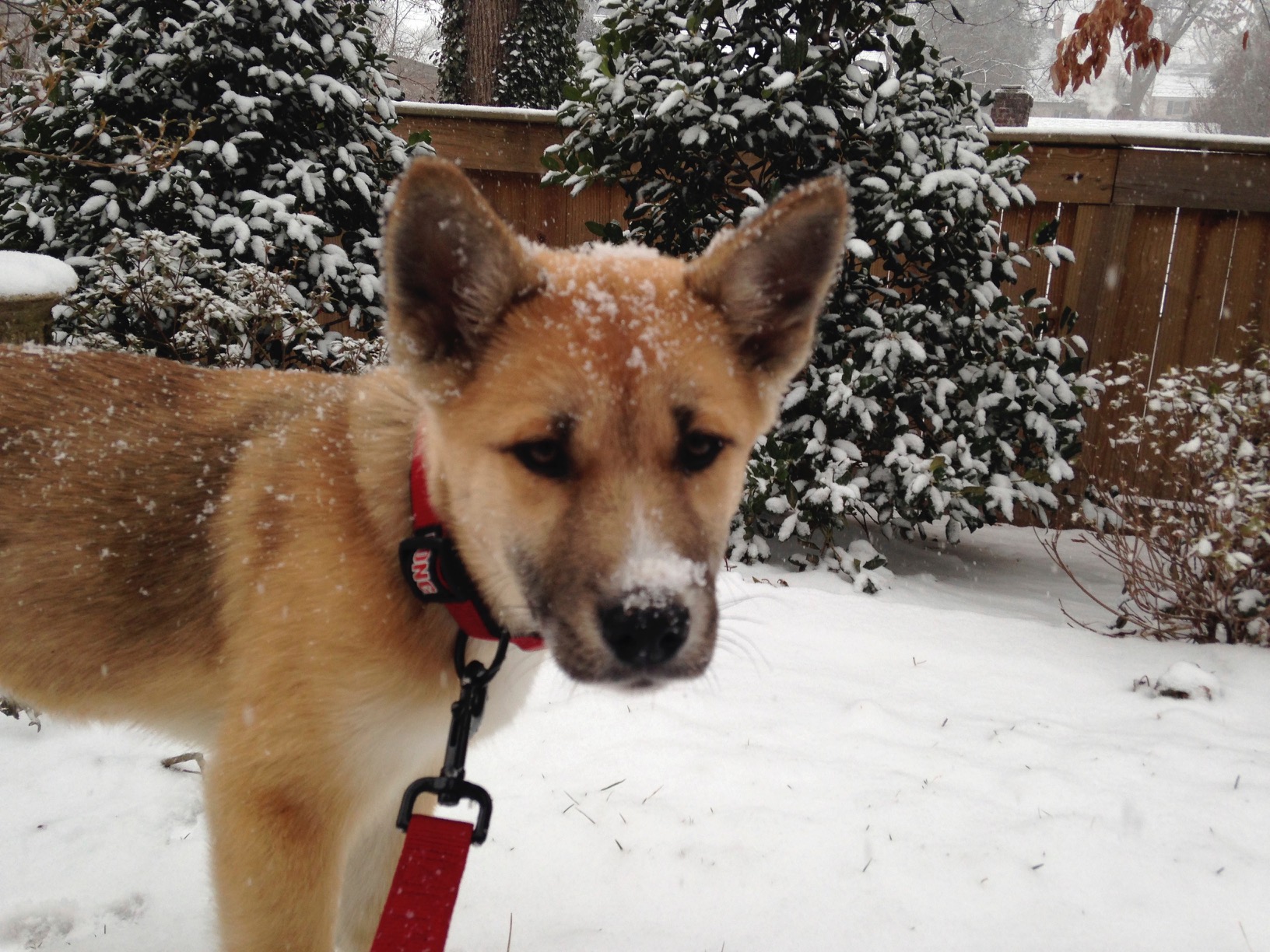
She was also strange. Carolina dogs have specialized habits that come from being semi-wild. The females dig snout holes. They tend to bury their poop, often using their snouts and paws to cover it up. They have weird vocalizations. She did all of this as a youngster, but after a while she mostly stopped (though she still makes some awesome arooo sounds). In the woods around D.C. she still kicks leaves over her Paul Krugman columns, but the only time she really buries stuff dingo-style these days is when she wants to bury a squirrel or Pippa’s tennis ball.
She’s also a very good dog now. She listens. She loves Pippa like a sister. And while she’ll still chase critters, it’s an entirely manageable, normal dog type thing.
Which brings me to this week. We’ve been in Georgia very close to her natural habitat. And it’s bringing the Carolina Dog out of her. I’m reminded of the time Godzilla is transported back in time to meet Marvel’s “Devil Dinosaur.” There’s a great sequence when Godzilla smells the blood and sulfur in the dank air and thinks something like, “This is home.”
If you think that’s weird, it can’t hold a candle to the time Godzilla was shrunk down to doll size and had to fight a New York City sewer rat.
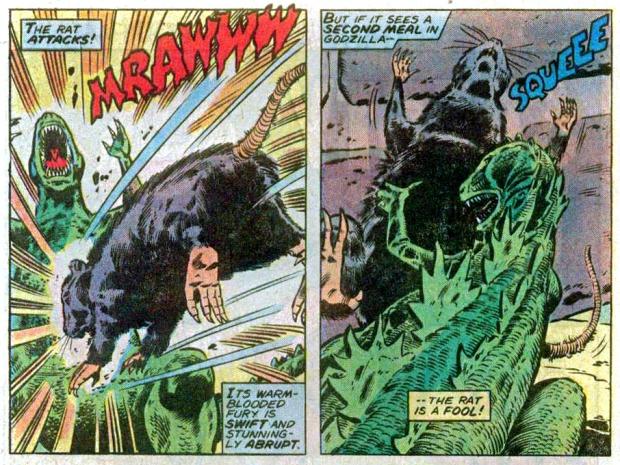
We’ve been taking her to an abandoned strip of beach a few times a day and she runs around like a dingo on a mission, digging snout holes and searching for critters in the sand. (Pippa meanwhile, is still the same Pippa. Like me, she can do her work anywhere). Yesterday, I even caught her using her paws and snout to bury a Krugman column. (I still picked it up.) The Fair Jessica reports that this afternoon she dug a hole so deep that only her tush and tail could be seen. She pulled up a crab. For a moment, at least, she became a city dog again. “What the Hell is this?” she said.
Maybe it’s an epigenetic thing. The mix of landscape and smells have switched on genes that have been off for a while. But since I don’t know squat about epigenetics, maybe it’s not. Maybe, it’s just bringing back the joys of youth, like when I go to a comic book store and suddenly feel the need to be super nerdy. But it is a joy to watch. The only problem is that it takes a lot more shouting than normal to get her to come back to us.
But she does, because she’s a good girl now. I just wish Cosmo could have taught her a thing or two.
Human Update.
My column today is on the uses and abuses of the term “the Deep State.”
I’ll be back with the usual weird links next week.
Correction: In Wednesday’s G-File a typo referred to “hunting humans for support.” It’s been fixed over at TheDispatch.com to “for sport.” Thanks to the folks who pointed out the mistake, but in my own defense, I’ve supervised enough interns to know the correct phrase.
Speaking of The Dispatch, please go to TheDispatch.com and sign up for all of our wares. It’s all still free and we’d be grateful if you did.
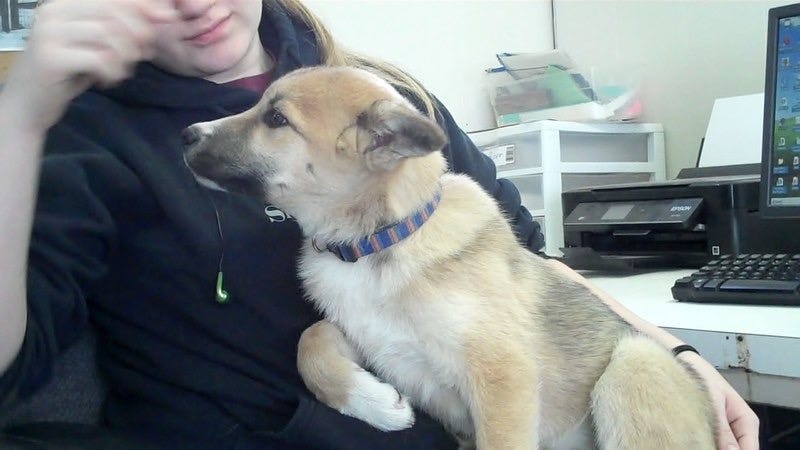





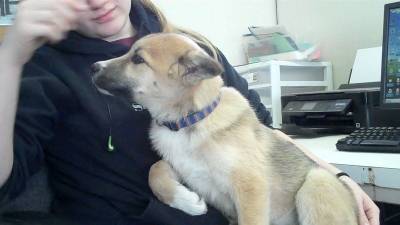
Please note that we at The Dispatch hold ourselves, our work, and our commenters to a higher standard than other places on the internet. We welcome comments that foster genuine debate or discussion—including comments critical of us or our work—but responses that include ad hominem attacks on fellow Dispatch members or are intended to stoke fear and anger may be moderated.
With your membership, you only have the ability to comment on The Morning Dispatch articles. Consider upgrading to join the conversation everywhere.